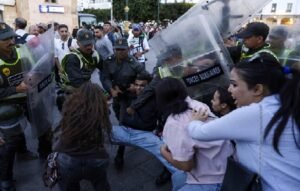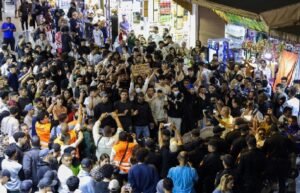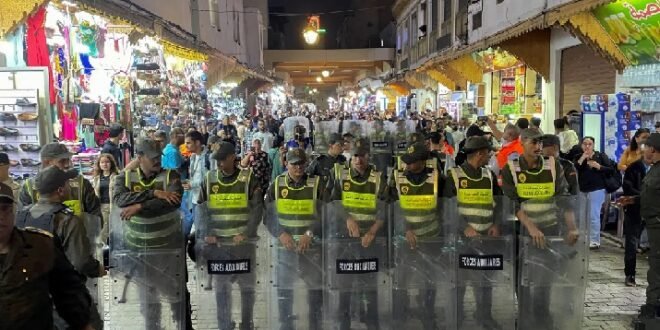04-10-2025
RABAT: Moroccan authorities have arrested more than 400 people during violent protests demanding reforms in the public health and education sectors, the Ministry of Interior says.
 A fifth night of youth protests was under way on Wednesday in cities across the North African country, but authorities said the fourth night had turned more violent than before. They reported that 263 members of the security forces and 23 civilians were injured as demonstrators’ torched cars and ransacked shops.
A fifth night of youth protests was under way on Wednesday in cities across the North African country, but authorities said the fourth night had turned more violent than before. They reported that 263 members of the security forces and 23 civilians were injured as demonstrators’ torched cars and ransacked shops.
The demonstrations have been organized online by a loosely formed, anonymous youth group calling itself GenZ 212, using platforms including TikTok, Instagram and the gaming application Discord.
Through chants and posters, they have contrasted the flow of billions in investment toward preparation for the 2030 World Cup, while many schools and hospitals lack funds and remain in a dire state.
On Tuesday night, young men brandished knives and threw Molotov cocktails and stones, an Interior Ministry spokesperson said in a statement. He said 409 people were taken into police custody.
Administrative buildings, banks and shops were looted or vandalized in the Souss region cities of Ait Amira, Inezgane, Agadir and Tiznit, as well as the eastern city of Oujda, he said.
Videos circulating on social media and verified by media showed damaged ATMs and a bank building that appeared to have been looted, with broken glass scattered across the ground. In posts discussing the protests, the GenZ 212 group said it rejected violence and was committed to continuing peaceful protests. It said it had no argument with security forces, only with the government.
The Interior Ministry statement said 142 vehicles belonging to the security forces and 20 private cars had been set on fire.
Pointing to new stadiums under construction or renovation across the country, protesters have chanted, “Stadiums are here, but where are the hospitals?” and alleged rampant corruption at the public’s expense.
 As Morocco prepares to host football’s Africa Cup of Nations later this year and politicians gear up for parliamentary elections in 2026, the link has drawn attention to how deep disparities endure in the country.
As Morocco prepares to host football’s Africa Cup of Nations later this year and politicians gear up for parliamentary elections in 2026, the link has drawn attention to how deep disparities endure in the country.
Despite rapid development according to some metrics, many Moroccans feel disillusioned by the growth’s unevenness, with regional inequities, the state of public services and lack of opportunity, particularly for youth, fueling discontent.
Peaceful protests against economic and social conditions have been recurrent in Morocco, but this week’s demonstrations are the most violent since at least 2016 and 2017, when protesters clashed with security forces in the Rif region in the north.
The Interior Ministry will uphold the right to protest in accordance with legal procedures and will respond with “restraint and self-control, avoiding provocation”, the spokesperson said.
The uprising follows similar youth-led, large scale demonstrations this summer in Nepal, Indonesia, the Philippines and Madagascar.
The uprising in Nepal led to the prime minister resigning, while Madagascar’s president dissolved his government on Monday in an attempt to placate the protesters there. Dozens of protesters have been arrested in Morocco, according to the AMDH, but most have since been released. It said that 37 youngsters were on bail, pending investigations.
The government coalition issued a statement on Tuesday expressing willingness to engage in dialogue with the youth “within institutions and public spaces to find realistic solutions”. (Int’l News Desk)
 Pressmediaofindia
Pressmediaofindia




